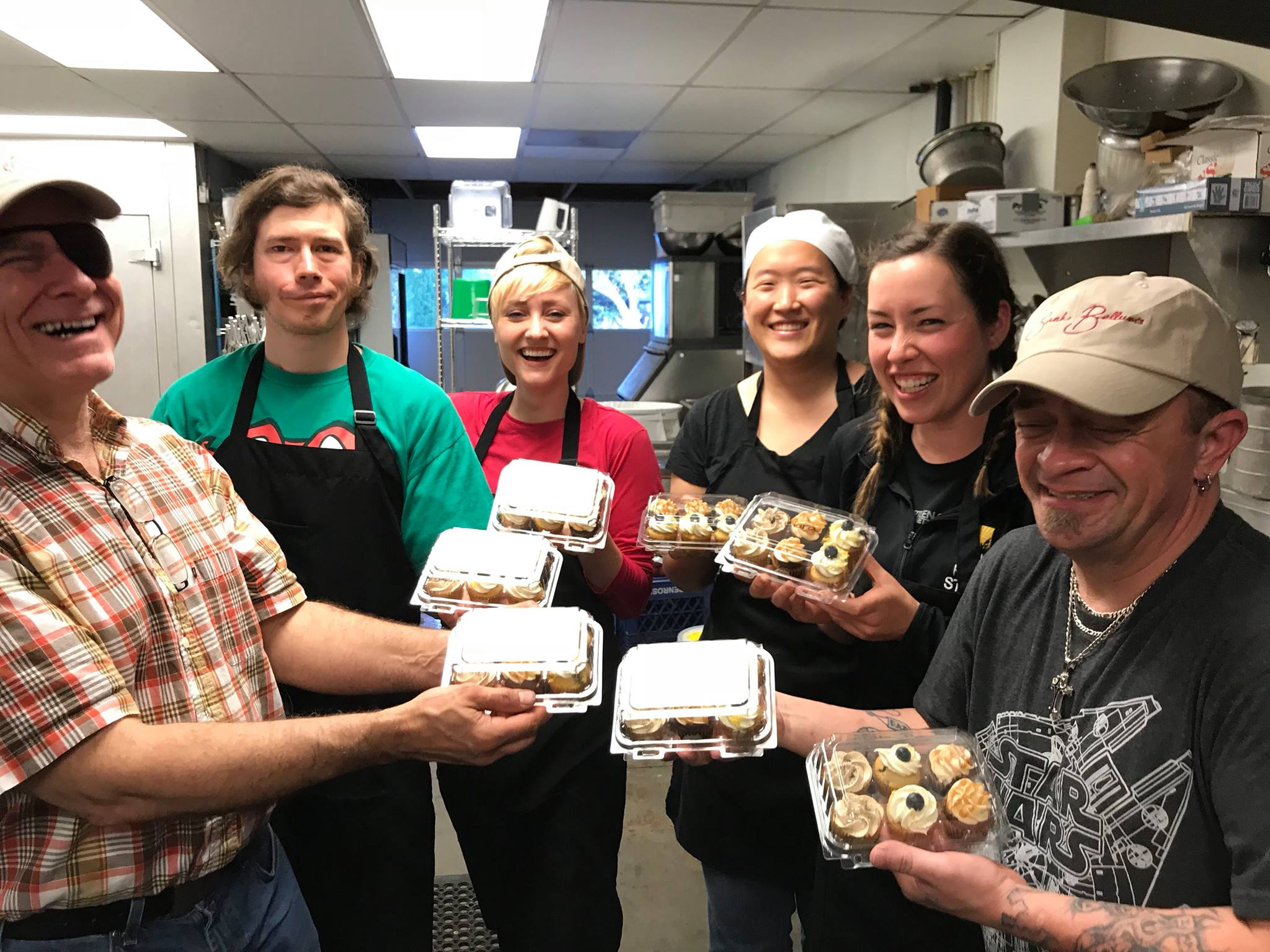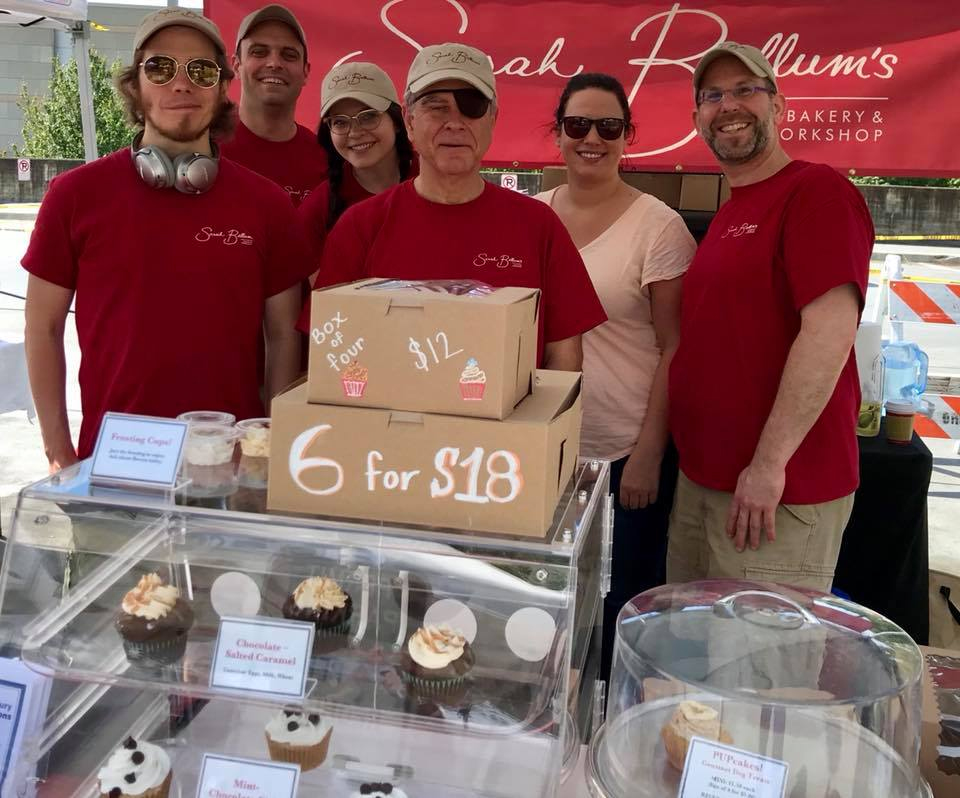Member Spotlight: Rik Lemoncello, PhD, CCC-SLP
In each newsletter, we feature an ANCDS member. This quarter we're talking with Rik Lemoncello, PhD, CCC-SLP, Associate Professor in the School of Communication Sciences and Disorders at Pacific University in Forest Grove, Oregon. His areas of interest include Acquired Brain Injury, Cognitive Rehabilitation, EBP, SoTL, and Social Participation following ABI. Rik is the founder of Sarah Bellum's Bakery & Workshop in Portland, Oregon.
ANCDS: Tell us about Sarah Bellum's Bakery & Workshop.
Rik Lemoncello (RL):
Sarah Bellum's Bakery & Workshop is a non-profit program in Portland, OR (USA) whose mission is to provide return-to-work opportunities for adults with acquired brain injury (ABI). In our bakery and workshop, participants with ABI do all of the bakery tasks, including preparing our baked goods made with quality organic ingredients from scratch (e.g., cupcakes, cookies, brownies, bars), sales and customer interaction, taking orders, and cleaning and organizing the shop. We offer job supports and coaching by trained volunteers, including graduate students in SLP and occupational therapy (OT).
We launched as a pilot program in 2017 and expanded our work in 2018. For the first two years, we worked out of a rental commissary kitchen and sold our specialty cupcakes at local farmer's markets each summer (and also at rehabilitation conferences and events throughout the year). In December 2018, we officially opened a brick-and-mortar shop in SW Portland, OR to be able to offer more and year-round opportunities. We have grown from supporting 4 adults with ABI in the first pilot year to now over 40 adults with ABI in our program. In addition to the 41 participants with ABI, we have 35 supporting volunteers for a full staff of over 70 volunteers! There is only one paid employee right now, who is our front of house manager for supervising the shop, customer interaction, ordering, and sales. Supervising and training in the back-of-house for baking are two SLPs, an OT, and a pastry chef.
ANCDS: Where did you get the idea for the Bakery?
When I first moved to Portland, OR in 2008, I had the opportunity to visit “Aphasia Camp Northwest” (www.aphasianetwork.org) – a social participation program for stroke survivors with aphasia founded by Dr. Lynn Fox. I was inspired by Dr. Fox’s vision to create the opportunity for families touched by aphasia to enjoy a weekend of camping, campfires, hiking, rope courses, fun, singing, good food, and good memories in a life participation model. While I was there, I thought to myself, “How can I create something like this for survivors of ABI with cognitive challenges? I love this, but I don’t camp! What do I enjoy? Baking! What if I created a program where folks with brain injury participate in baking and selling baked goods? Yes! That’s it!” And the idea was hatched over ten years ago! This idea simmered on the back burner for many years, but never faded. I knew it would be a great endeavor requiring funding and commitment as well as inter-professional collaboration.
stroke survivors with aphasia founded by Dr. Lynn Fox. I was inspired by Dr. Fox’s vision to create the opportunity for families touched by aphasia to enjoy a weekend of camping, campfires, hiking, rope courses, fun, singing, good food, and good memories in a life participation model. While I was there, I thought to myself, “How can I create something like this for survivors of ABI with cognitive challenges? I love this, but I don’t camp! What do I enjoy? Baking! What if I created a program where folks with brain injury participate in baking and selling baked goods? Yes! That’s it!” And the idea was hatched over ten years ago! This idea simmered on the back burner for many years, but never faded. I knew it would be a great endeavor requiring funding and commitment as well as inter-professional collaboration.
Fast forward to 2016. I was called into the Dean’s office in the College of Education at Pacific University to be informed that I had been selected as the next “Thomas S. Thompson Distinguished Professor of Education” award recipient. Not only was this amazing recognition of my work to date, but this award provided three years of funding to develop a scholarly program of my choosing. I discussed a few options with the Dean, and we agreed that launching this “brain bakery program” (as it was first named) was a worthy endeavor. And so began the journey.
ANCDS: What have you learned from the experience of setting up/running the Bakery?
RL: This is not for the faint of heart. Starting and running a full-time program like this is no joke. It takes patience, dedication, passion, collaboration, and of course, funding. While I have always enjoyed baking, and am an avid self-taught baker (tip: “The Cake Bible” is a great book that is a treasure trove of scientific tips involved in baking), entering a commercial kitchen was a new experience. I needed to learn all about food service, licensing, consumer protection, foodborne illness prevention, and kitchen management so that I could distill down the basics and teach our crew how to safely and effectively prepare food for sale to the public. This was a steep learning curve! I also needed to befriend the local restaurant supply store and ask lots of questions to determine the proper and best equipment that ensures both food safety for consumers and accessibility for our crew. Careful planning, organization, research, inquiry, and perseverance have been mainstay requirements.
That much executive functioning work can also be exhausting, so striking a balance has been critical. We started small, just operating for six weeks during the summer our first year, as a pilot program. We baked in a commercial kitchen once a week (without air conditioning, even when it was 95-100 degrees outside, next to the hot ovens – sometimes we had to decorate the cupcakes in the walk-in freezer so the icing didn’t melt!), and took our cupcakes to a local farmer’s market to sell (there’s another chapter about how to work at the markets, for another day!). In between, I had time to debrief, make adjustments, and plan for the next round. Training a staff of graduate students to supervise and coach our bakers with brain injury was also a learning process for everyone involved. But in the end, it was a successful endeavor, and we learned that this program was feasible. With continued efforts, we have continued to gradually expand with careful planning and shared decision-making along the way. It certainly takes a village!
ANCDS: How does the Bakery support people with neurogenic communication disorders?
RL: This is a social participation program that focuses on individual strengths. We conduct an initial on-the-job assessment to see how the participant performs with the baking, cleaning, decorating, and sales tasks. We determine what kinds of supports each individual may need. Then, we match each participant to the job that best matches their strengths. For example, I have learned that folks with ABI who present with dysexecutive functioning “impairments” such as impulsivity and lack of the “frontal filter,” can make excellent sales people! Others who present with declarative memory impairments and anterograde amnesia benefit from the routine and repetition of the baking process and following our task analyzed recipe checklists. Through errorless instruction with regular repetition in a functional setting with natural feedback and natural consequences has allowed folks with significant memory challenges to also participate in the baking process.
We support our staff of folks with ABI in many other ways as well. The entire kitchen and shop are set-up in an organized fashion (our volunteer pastry chef tells me he never worked in a kitchen as clean and organized as ours!), with everything labeled for where it belongs. Our measuring spoons and scoopers are all color coded to reduce potential for confusion (and facilitate supervision). We have adapted each recipe through task analysis to break down the steps involved in baking, including gathering materials, raising and lowering the mixer while mixing, and ensuring accuracy in measurement (e.g., self-talk: “2 of 4 tablespoons”). Other external supports include signs that label each sink, posted instructions for handwashing and dishwashing, and consistent coaching through the processes.
More importantly, however, is the impact we have been able to have on the lives of our crew. Our tagline is “Changing Lives One Cupcake at a Time” – and we have been able to do this. Sarah Bellum’s Bakery & Workshop provides a safe and supportive environment for our crew to re-enter the world of the workforce. Peer interactions offer support and opportunities for building insight through natural interactions. In one outcomes study we have conducted so far (search for our 2018 ASHA poster), we demonstrated that while our participants did not improve on impairment-level measures of cognition, they all consistently reported an impact on their sense of purpose, identity, and having meaning in their lives. That is what a social participation program is all about, and that is why we have created this program – to provide meaningful opportunity and purpose. One of our bakers likes to tell customers that “we are bringing light to a dark area.”
 ANCDS: How does the Bakery support student learning and interprofessional education?
ANCDS: How does the Bakery support student learning and interprofessional education?
RL: A fundamental aspect of what we do at Sarah Bellum’s Bakery & Workshop is education. Not only does our staff of folks with ABI learn about how to bake and sell through meaningful work opportunity, but our support staff of mostly graduate students from SLP and OT gain meaningful exposure to the real-life impact of ABI. As a faculty member, my primary responsibility is to the educational experience of our students. With my focus on cognitive rehabilitation, I can share in the classroom how ABI is unique for each individual and the functional impact of various cognitive impairments for a person, but nothing can replace the lived experience for a student to work alongside a person with ABI who is learning a new skill in a functioning real work program. Each semester, I supervise students as they learn about ABI and how to provide effective cognitive-communication supports for our crew. In our second year of operating, I began collaborating with a colleague from the School of Occupational Therapy to also involve OT students, which allowed for enhanced interprofessional practice. Through seminar meetings and on-the-job consultations, students from both disciplines learned about each others’ roles, how to effectively communicate and collaborate on the team, and where there is also overlap in cognitive rehabilitation. As we continue to expand our operations, I would also like to involve students from social work, psychology, physical therapy, audiology, culinary programs, and any related disciplines to learn together in this functional return-to-work setting. We are also in the process of contracting with our state Office of Vocational Rehabilitation to offer additional funding for our assessments and job coaching, as well as the opportunity for students to engage in the Voc Rehab process.

There are so many amazing possibilities for engaging with students and interprofessional practice in this program. I am greatly looking forward to my sabbatical this Fall to dive deeply into the literature on vocational rehabilitation (our ANCDS TBI writing group is exploring this topic currently!) and identity (re-)formation after ABI though more formal research to investigate the impact we are having and working to disseminate our findings.
